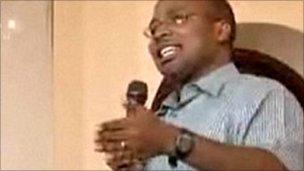Uganda gay death penalty rejected by Pastor Ssempa
- Published

Pastor Martin Ssempa is known for his fiery rhetoric against homosexuality
A backer of Uganda's Anti-Homosexuality Bill has told a parliamentary committee he does not support the proposal of the death penalty for some homosexual acts.
But Pastor Martin Ssempa urged MPs to pass the legislation, which tightens laws against homosexuality.
The bill's proponents and opponents have been making their case during two days of public committee hearings.
The bill, first introduced in 2009, sparked international condemnation and had been quietly shelved until now.
Uganda is a largely conservative society and many people condemn homosexuality both as unAfrican and unChristian.
But in recent years, some gay rights groups have been set up in the country.
A parliamentary spokesperson told the 91ČČąŹ it was unlikely MPs would get to vote on the bill before the current parliamentary session ends this week.
A new parliament is to be sworn in next week, following elections in February.
'Killing our society'
Uganda has come under intense international pressure over the bill, which proposes increasing the penalties for homosexual acts from 14 years in prison to life.
It also proposed the death penalty for a new offence of "aggravated homosexuality" - defined as when one of the participants is a minor, HIV-positive, disabled or a "serial offender".
But according to AP news agency, MP David Bahati, who proposed the legislation, last month said that the death penalty "was something we have moved away from".
Pastor Ssempa also rejected this clause but nevertheless urged the Legal and Parliamentary Affairs Committee to back the bill.
"The parliament should be given the opportunity to discuss and pass the bill, because homosexuality is killing our society," AP news agency quotes him as telling the MPs.
An opponent of the bill, Anglican Bishop Christopher Senyonjo, told the committee that the proposals would not stop homosexuality and further criminalising gay people would adversely affect the fight against HIV/Aids.
Under the proposals, people could face jail for failing to inform the authorities if somebody confided their homosexual activities to them.
"If we criminalise the LGBT [lesbian gay bisexual and transgender] community further, it will drive Ugandans further underground and compromise the relationship of medical, counsellors and clergy that is sacrosanct and needs to remain confidential,", quoted the bishop as saying.
MP David Bahati has said the death penalty clause is likely to be dropped
"How can we expect doctors to treat everyone when this bill will require them to report on their patients who are LGBT?" he said.
Some gay activists in Uganda have said the public hearings were intended as a .
In January, David Kato, a campaigner who led condemnation of the Anti-Homosexuality Bill, was murdered not long after suing a paper that outed him as gay. Police denied the killing was because of his sexuality.
Three months before the murder, Uganda's Rolling Stone newspaper had published the photographs of several people it said were gay, with the headline "Hang them."
- Published4 May 2011
- Published27 January 2011
- Published29 January 2011